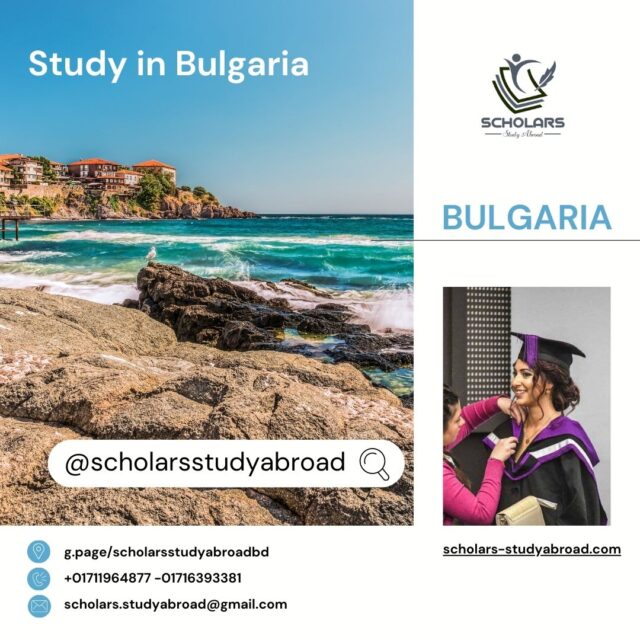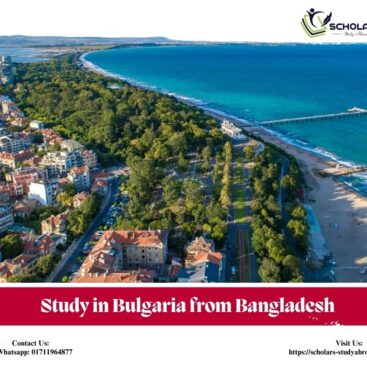Bulgaria Student Visa. Studying in Bulgaria can be a great opportunity for international students. The country offers a range of educational institutions and programs, and the cost of living and tuition fees are relatively affordable compared to many other European countries. Bulgaria offers a vibrant and diverse student life. You’ll have opportunities to participate in extracurricular activities, join student organizations, and engage in cultural events. Bulgaria’s rich history, picturesque landscapes, and affordable travel options make it an excellent location for exploring during your leisure time.
Bulgaria Student Visa – Here’s some information to help you understand studying in Bulgaria
The application(Student Visa) for the September 2023 intake is still ongoing. Most Universities generally have two intakes. One in February and the other in September.
Universities and Programs: Bulgaria has several universities and colleges that offer a wide range of academic programs in various fields, including sciences, humanities, engineering, hospitality, and more. Some of the top universities in Bulgaria are Sofia University, Technical University of Sofia, and Plovdiv Medical University.
The Bachelor’s program that we offer in English goes as follows:
Software Systems and Technologies
Business Administration (with pathways)
Gastronomy and Culinary Arts program
International Business Management
Hospitality and Culinary Arts
Food Technology in Culinary Arts
Master’s programs that are taught in English.
Master’s of Business Administration
Master’s of International Tourism
Quality of Education: Bulgarian universities maintain high academic standards and provide quality education. Many universities have collaborations with international institutions, offering students opportunities for exchange programs, joint research projects, and internships. It’s a good idea to check the accreditation and rankings of the university and program you’re interested in to ensure their academic reputation for a student visa.
Cultural Experience: Studying in Bulgaria allows you to immerse yourself in a rich and diverse cultural experience. The country has a unique blend of Eastern and Western influences, reflected in its architecture, cuisine, traditions, and festivals. You’ll have the chance to interact with local students, explore historical sites, visit museums, and discover the beauty of Bulgarian nature.
Safety and Hospitality: Student visa Bulgaria is generally considered a safe country for international students. The locals are known for their warm hospitality and friendly nature, making it easier for newcomers to adjust and feel welcome. Universities often provide support services for international students, including orientation programs, accommodation assistance, and academic advising.
Employment Opportunities: While studying in Bulgaria, international students are allowed to work part-time during the academic year and full-time during semester breaks, provided they have the necessary work permits. However, it’s important to note that the job market for non-Bulgarian speakers may be limited, so having a basic understanding of the Bulgarian language could enhance your employment prospects.
Post-Graduation Options: Upon completing your studies, you may have the opportunity to extend your stay in Bulgaria to search for employment. The country offers various programs and incentives to retain international talent, particularly in high-demand sectors. Graduates from Bulgarian universities are also eligible to explore job opportunities within the European Union.

Language of Instruction: Bulgarian is the official language in Bulgaria, but many universities offer programs in English, especially at the postgraduate level. If you’re planning to study in English, it’s important to check if your desired program is available in that language.
Admission Requirements: Each university in Bulgaria has its own admission requirements, which may include academic transcripts, letters of recommendation, and a personal statement. It’s essential to review the specific requirements of the university and program you’re interested in.
- Duly completed Application Forms of the University
- Up-to-date passport.
- High school educational documents (high school diploma and mark sheets)
- Certificate of English proficiency (if the applicant has such)
- Bachelor’s degree and Academic transcript for Master’s studies.
- 2 letters of recommendation (in English, containing recommendations from the teacher and/or employer, contacts, signature and seal of the recommender).
- Curriculum vitae in English.
- Cover letter.
- Filled in Declaration of Personal Data Collection
It is possible to apply without IELTS. However, please bear in mind that you will be required to take the online English exam of Uni upon the successful completion of the online motivational interview. We (Scholars Study Abroad) will help you every step of the way.
Tuition Fees and Scholarships: Tuition fees in Bulgaria vary depending on the university and program you choose. On average, they are relatively affordable compared to other European countries. Additionally, there are scholarships available for international students, both from the Bulgarian government and other organizations. It’s advisable to explore these scholarship opportunities.
- Tuition Fee Bachelor’s program with English language Training: 1950 -2250€ per semester for non-EU and EEA citizens.
- Tuition Fee MBA Program for 3 semesters: 1950 -2250€ per semester for non-EU and EEA citizens
- International Students have the opportunity to receive a scholarship in the amount of 1000 to over 4000 BGN per year (according to the conditions of the Ministry of Education and the European Social Fund), depending on the application result and success during study at Uni.
- Newly enrolled students in a Bachelor’s degree program are eligible to apply for a scholarship for the first academic year of their education in English language programs.
- The applicants who are eligible for a scholarship of up to €250 for the first academic year shall undergo a motivational interview at Uni and shall have successfully passed an English language exam at VUM with a score over 75%.
The newly enrolled students can also apply for scholarships provided in collaboration with University’s partnering organizations amounting from €250 up to €1000 for the first academic year. The students applying for this type of scholarship should have acquired an English language certificate (IELTS, TOEFL, PTE, CAE, SAT) or should have scored high on the state matriculation exam in English.
Scholarships after the first academic year
After the first academic year, all the students, who have successfully passed their exams during the examination sessions as per the approved exam schedule for the respective academic year by the start of the due academic year, are eligible for an Academic Performance Scholarship (merit-based). This scholarship is calculated based on the exam results from the previous two semesters.
The students in the “Hospitality and Culinary Arts” and “Gastronomy and Culinary Arts” programs who have successfully passed their exams within the examination sessions as per the approved exam schedule for the respective academic year by the start of the due academic year are eligible for an Academic performance scholarship as of the third year of their studies.
Scholarships for Master’s students
- Every newly enrolled Master’s degree student is eligible to apply for a scholarship during the admission process.
- The applicants who are eligible for a scholarship up to €250 shall undergo a motivational interview at Uni and shall have successfully passed an English language exam with a score over 80%.
- The newly enrolled students may apply for scholarships provided by the University’s partnering companies amounting from €250 up to €1000 for the whole period of education only if they present a valid English language certificate (IELTS, TOEFL, PTE, and CAE) and have submitted the full set of required documents for the particular Program.
- Students with a Bachelor’s Degree in the English language from Uni continuing their education in a double-degree Master’s Program are eligible for a Scholarship amounting from €500 up to €1000.
Cost of Living: Bulgaria is known for its low cost of living compared to many other European countries. Accommodation, transportation, food, and entertainment expenses are generally affordable, making it more budget-friendly for students.
Student Visa Bulgaria: If you’re a non-European Union (EU) student, you will need a student visa to study in Bulgaria. You should contact the Bulgarian embassy or consulate in your home country to get information about the visa application process, required documents, and any specific requirements.
- Valid passport: Your passport must be valid for at least six months beyond the intended duration of your stay in Bulgaria.
Completed visa application form: Fill out the form accurately and provide all the requested information. - Letter of acceptance: Submit the official letter of acceptance from the Bulgarian educational institution.
- Proof of financial means: You may be required to demonstrate that you have sufficient funds to cover your tuition fees, living expenses, and any other costs during your stay in Bulgaria. This could be in the form of bank statements, scholarship letters, or financial guarantee letters.
- Health insurance: Obtain health insurance coverage for the duration of your stay in Bulgaria.
- Proof of accommodation: Provide documentation showing where you will be staying in Bulgaria, such as a rental agreement or a letter from the educational institution confirming your accommodation.
- Passport-sized photographs: Attach recent passport-sized photographs to your application form.
- Application fee: Pay the required visa application fee, which may vary depending on your home country.
- Interview and biometrics: Depending on your nationality and the specific requirements, you may need to attend an interview at the embassy or consulate. Biometric data, such as fingerprints, may also be collected during this stage.
Visa processing: After submitting your application, it will be processed by the Bulgarian authorities. The processing time can vary, so it’s recommended to apply well in advance of your intended travel dates.
Visa decision: Once a decision has been made on your visa application, you will be notified by the embassy or consulate. If approved, you will receive a visa sticker affixed to your passport.
Travel to Bulgaria: With your student visa, you can travel to Bulgaria and begin your studies at the educational institution you have been accepted into.
Remember that visa requirements and procedures can change, so it’s important to consult the nearest Bulgarian embassy or consulate or visit their official website for the most up-to-date and accurate information regarding student visas for Bulgaria.
Follow us: Facebook Linkedin Instagram Twitter Pinterest Blogger Youtube
Author:
Arifin Badal
Whatsapp: 8801711964877
Email: scholars.studyabroad@gmail.com



